The local forest beyond production. Conclusions of the conference "Common Forestry. Canto pasado hai no futuro".
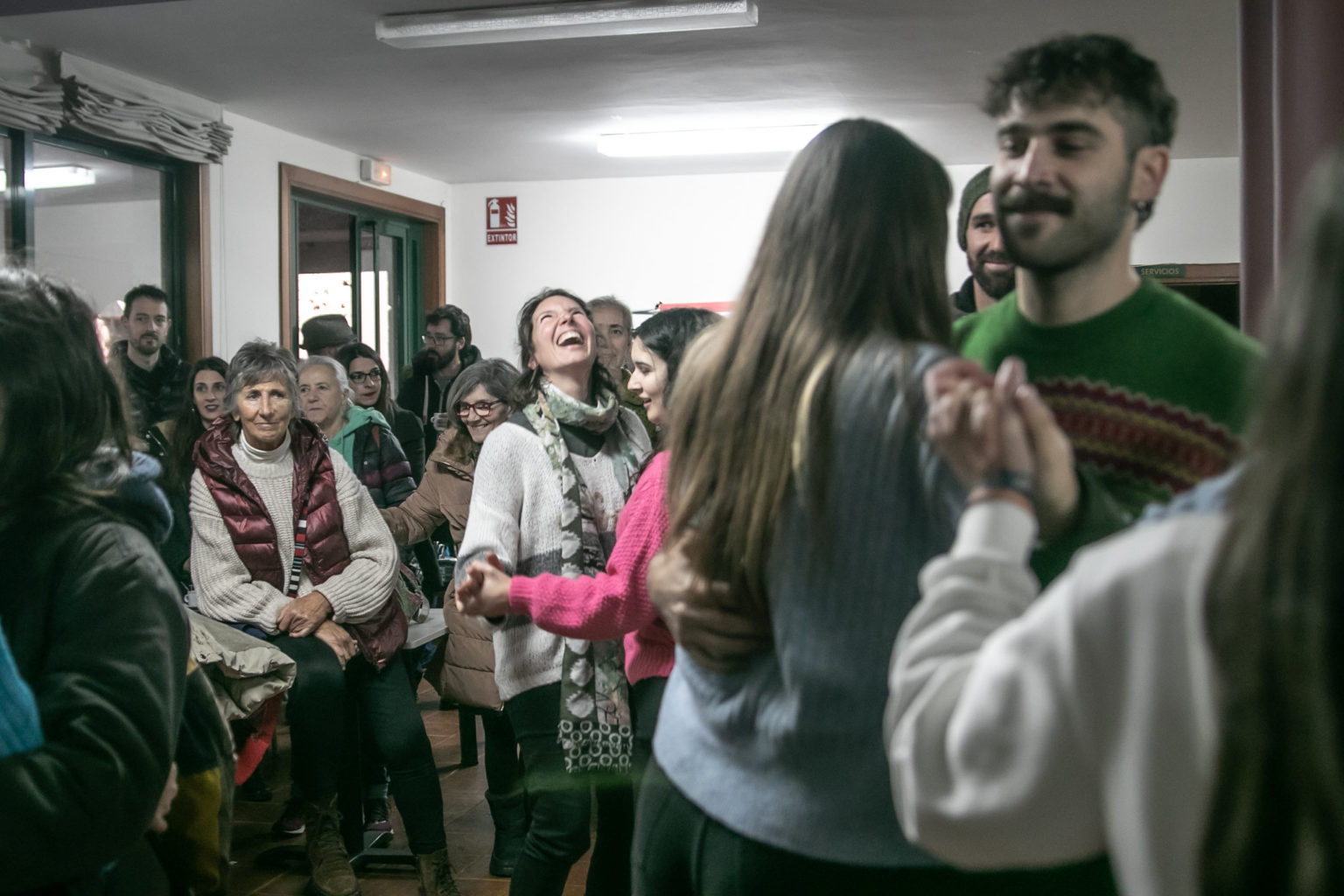
Productivism is a lens through which we hear the world, everything revolves around it and obviates all those social networks that are not productive, but that make life. The care, the support networks, the meeting places, the party, the socialisation are reproductive aspects that also make the community together. This transmedia story collects some of the conclusions of the conference 'Montes Comunais. Canto pasado hai no futuro', which was held on 16 December in Couso (Gondomar) within the framework of the participatory artistic project Terra Común.
To read the text in English click here.
Terra Común is one of the artistic projects being developed within the framework of Concomitentes and funded by Creative Europe through the Art Living Lab for Sustainability project. The aim of this project is to develop an artistic process based on the social demands of the community of Couso, located in the municipality of Gondomar, Pontevedra.
Beyond the finalist question, the project is made up of a series of meeting spaces expanded on the powers of the local mountain. An investigation based on life turned into a theoretical framework through experience. This meeting, which was held on 16 December, had life as a common axis and how the local mountain is not a separate entity from life, but a shared sphere.
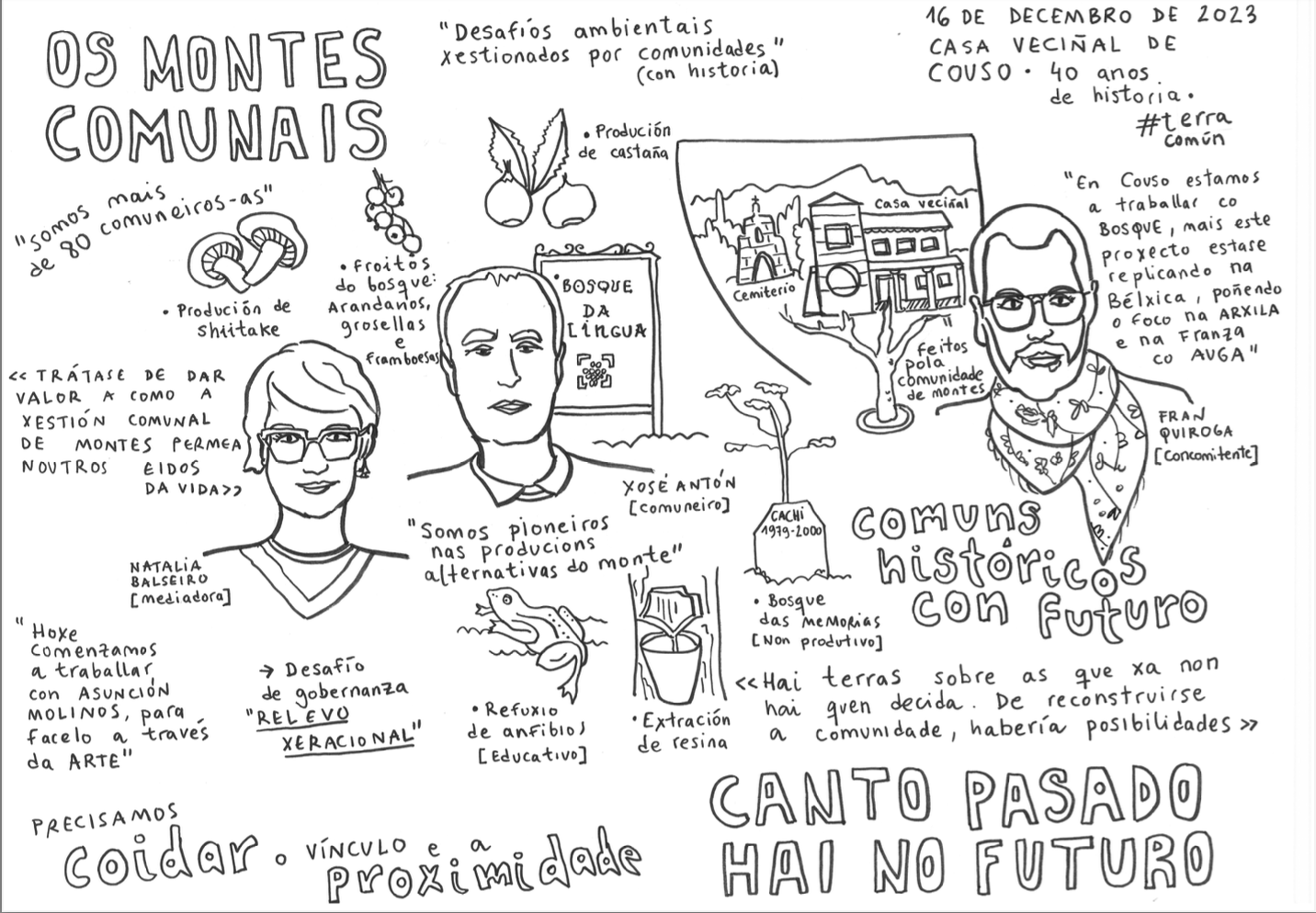
O marco da comunidade de montes, da xornada e do proxecto europeo iniciaron o encontro da mano de Xosé Antón Araúxo, President of the Comunidade de Montes de Couso; Natalia Balseiro, mediadora do proxecto ‘Tierra Común’, and de Fran Quiroga, General Coordinator of Concomitentes. This intervention marked the start of the day.
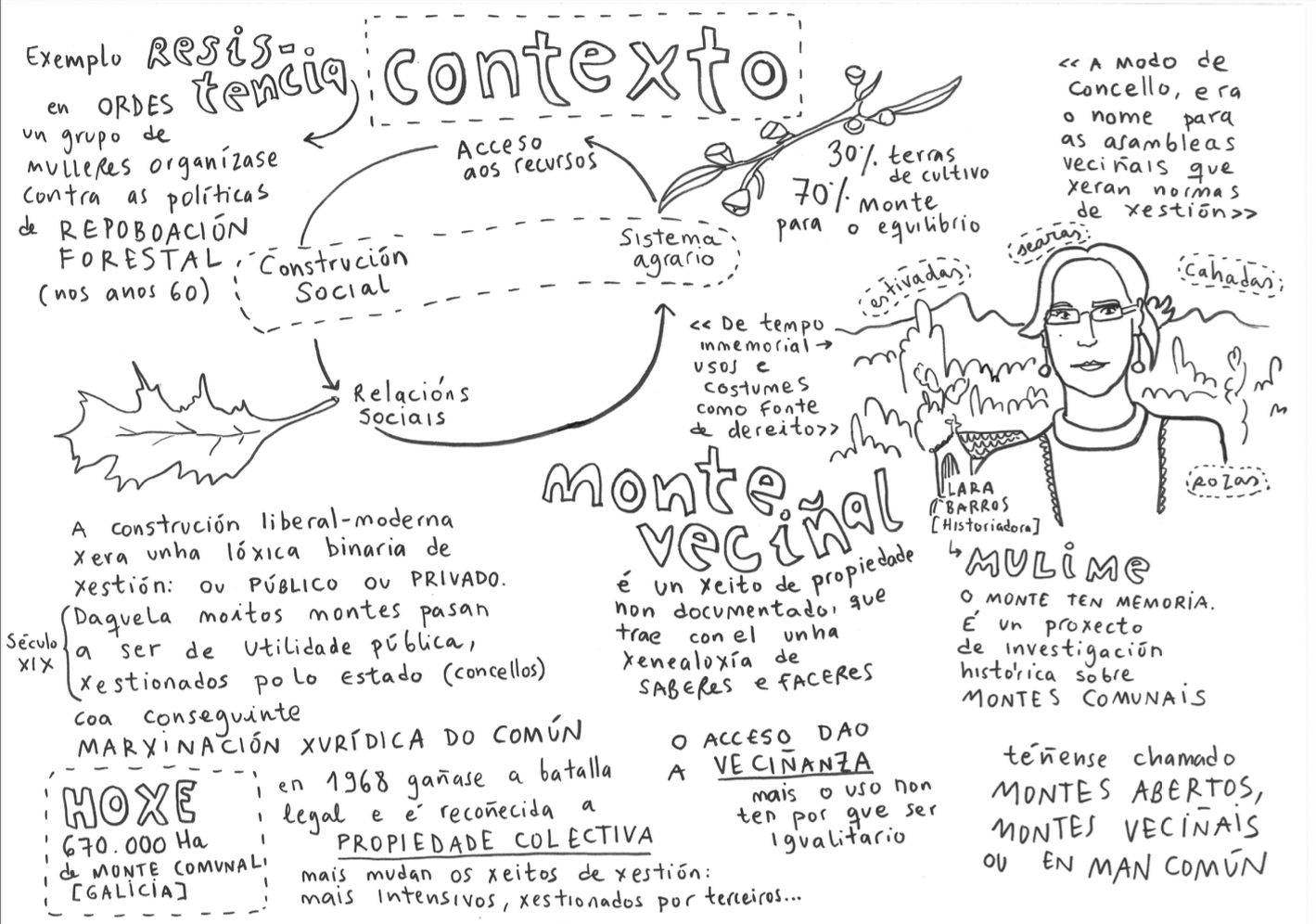
Lara Barros, historian and promoter of Mulime, The project, a professional historical and documentary research project for Comunidades de Montes Veciñais en Man, shared the historical importance of the local forest in the social, environmental and economic fabric of the village, and how, despite the rupture brought about by Franco's regime and his forestry policy, the forest has both a past and a future, mais precisa seguir dando resposta aos retos contemporáneos, coma sempre O monte veciñal no foi un fenómeno inmóvilo ao longo do tempo, senon que sempre se adaptou ao seu tempo, garantindo a súa inviolabilidade, indivisbilidade, imprescriptibilidade e inebargabilidade.
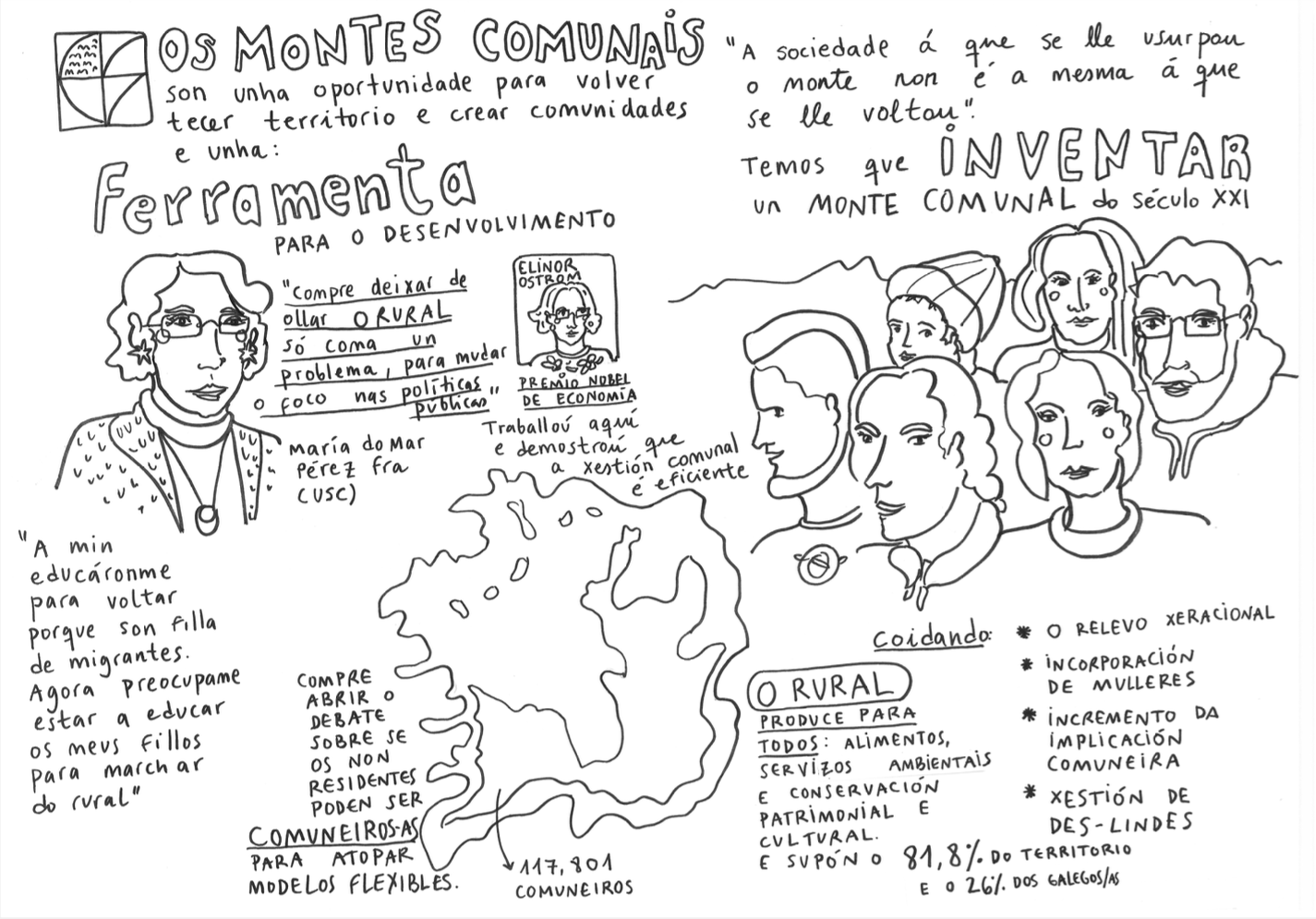
Coa profesora de Economía Aplicada da Universidade de Santiago de Compostela Mar Pérez Fra we explore the importance of the mountain in the current ecosystem of rural Galicia, which alerted us to the need to rethink the idea of the rural as a problem by situating it as a power, as it is a living space. At the same time, it is necessary to abandon the fallacious idea of backwardness and restore the look on the resilience that these communities have and that help us to have a spur with which to think of ways towards the ecosocial transition.

A vez que a integrante de Comunidade de montes de Reboreda en Redondela, María Belén Fervenza Couñago, will try to give an answer to the possibilities of generational change in these areas. Belén is a biologist, a netologist and the daughter of farmers, she embodies the generational change in her own family. She is committed to the step, of some people, to start life projects in rural areas, using the forest as a reservoir and as a way of tackling the challenges of climate change.
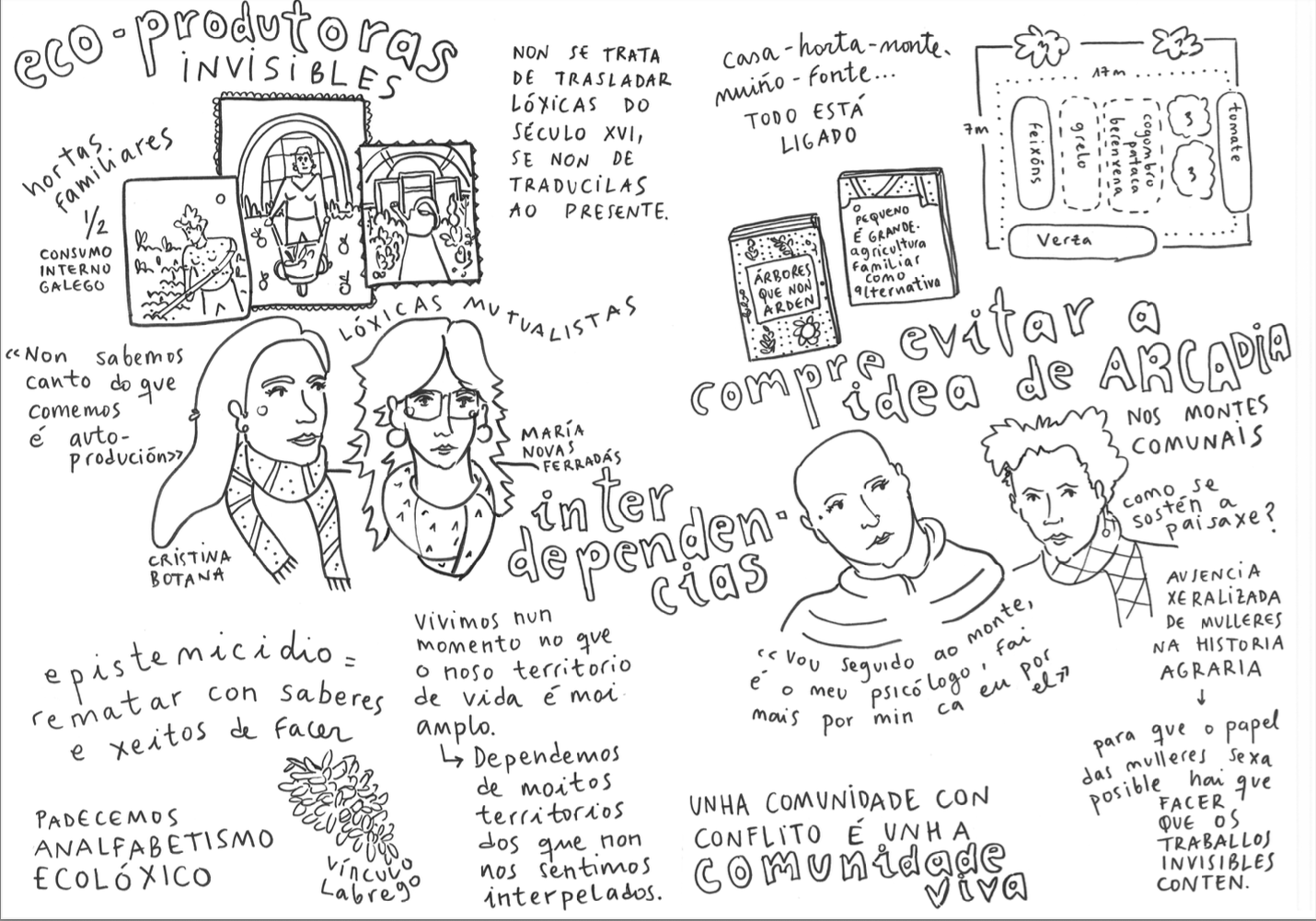
The morning ends with a conversation between an architecture graduate, Maria NovasThe researcher Cristina Botana They propose the recovery of the idea of eco-dependence, understanding ourselves as part of a network of mutualisms, knowing that we are vulnerable and responsible for the territories and systems of life of which we are a part. They place monetised and non-monetised activities at the centre, both of which are necessary to sustain life, as well as the relevance of family gardens in our food through these mutualistic logics.
In the afternoon, we also screened the film O Monte é Noso created in 1978 by Llorenç Soler and co-financed by the forest communities themselves, who were already warning of many of the dangers they still face today. A documentary that already forms part of the memory of the protest.
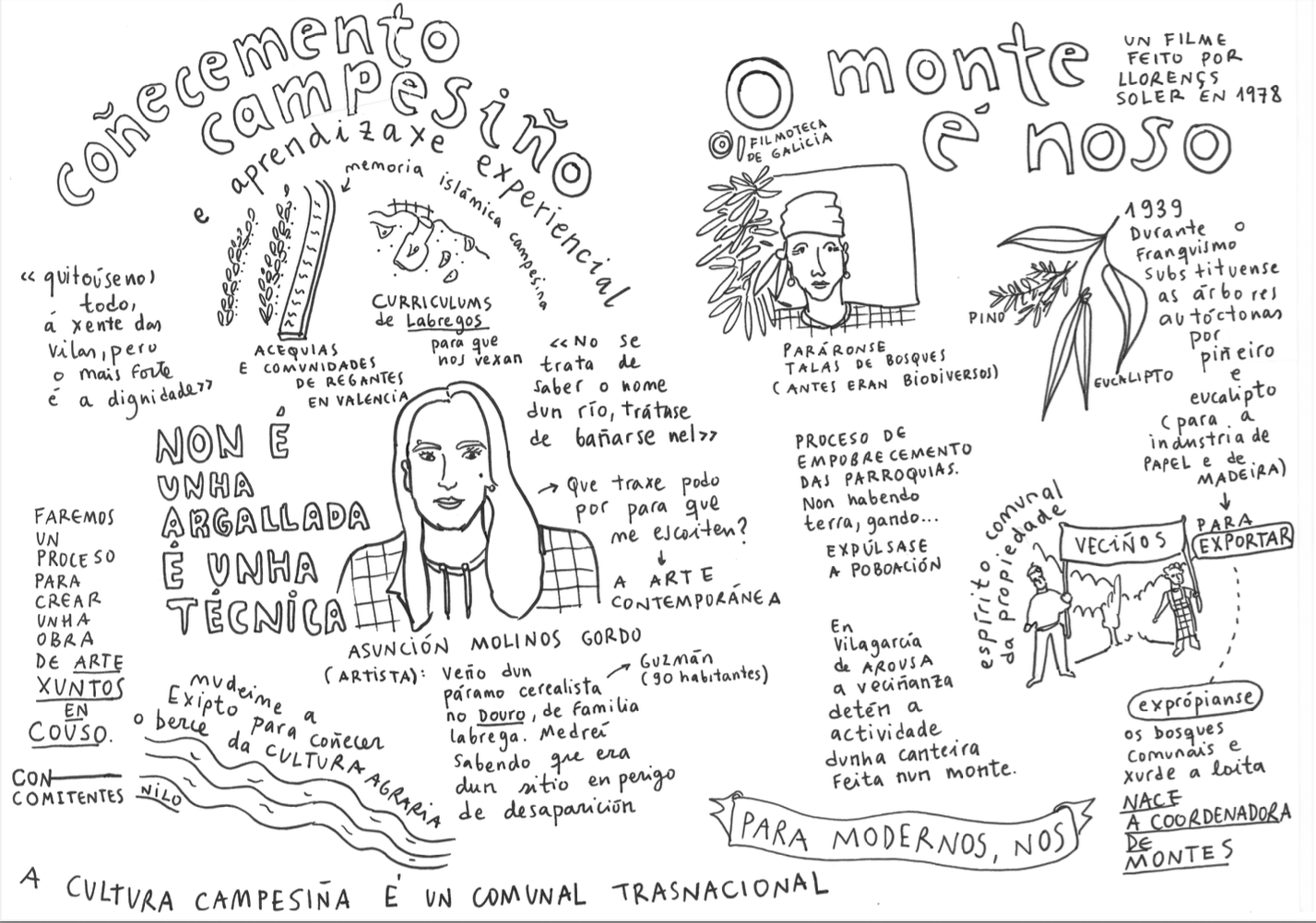
Walking through the local mountain is a sensorial experience and the very way of inhabiting it has a sensorial regime, so wouldn't it be interesting to experience other new perceptions that help us to discover other new aesthetics to increase the relationship of human beings with the mountain? This is the challenge on which the artist is going to work, Asunción Molinos Gordo, who was invited to initiate the artistic process with the community of Couso.
Through a conversation with the mediator of ‘Terra Común’, Natalia Balseiro, the artist and researcher talked about her professional career, which has among its main areas of work the creation, through art, of spaces for the enunciation of rural communities. An opportunity for art to relate from other points of view what happens in the village, the problems faced by communities subalternised by the idea of progress and in whose work there was and is a lot of resistance and resilience.
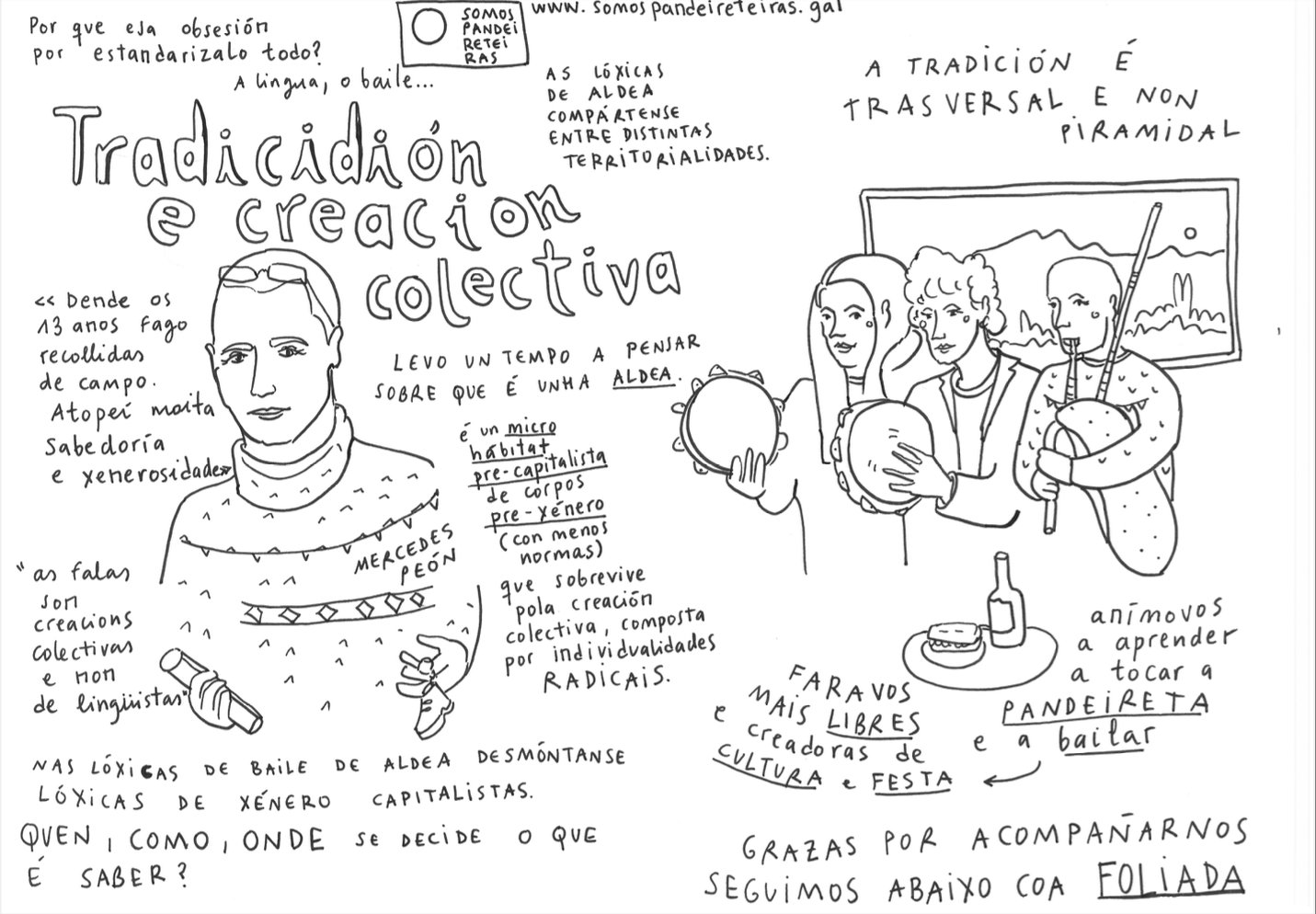
E se o monte é un común, tamén o é a música, grazas a artista Mercedes Peón who, after thirty years of collecting in villages, develops a theoretical thinking around them in order to value them in a contemporary context. Mercedes presents the village as a microhabitat that survives thanks to collective creation. The root individualities that make it up are the ones that ensure its survival through the resolution of the conflicts that arise in it through this collective way of operating.
We could not finish the meeting in any other way than with music and dance, thanks to We are Pandereitas, a collective of pandeireteira women who try to promote the legitimisation of the social representation of the pandeireteira women as the centre of cultural transmission in the contemporary traditional musical eido. many friends who accompanied us at a meeting where we celebrated research, knowledge, experience, thought, and life as a common good. Knowing that we are not alone, we are sharing together.

We would like to take advantage of this space to thank the Festivities Committee who accompanied us in the cafeteria of the Local veciñal, as well as all the Couso neighbours, with whom sharing time is always a pleasure to make their mountain a shared home.
Productivism is a lens through which we look at the world, everything revolves around it and obviates all those social networks that are not productive, but which make life. Care, support networks, meeting spaces, parties, socialising are all reproductive aspects that also make neighbourhoods into a common hand. This story transmedia The following are some of the conclusions of the conference ‘Montes Comunales. How much of the past is in the future’.’, which was held on 16 December in Couso (Gondomar), within the framework of the participatory art project ‘Tierra Común’.
‘Common Ground’ is one of the artistic projects being developed within the framework of Concomitentes and funded by Europa Creativa through the ‘Art Living Lab for Sustainability’ project. The aim of the project is to develop an artistic process based on the social demands of the community of the Couso neighbourhood hill, located in the municipality of Gondomar, Pontevedra.
However, beyond this ‘outcome-focused question’, the project is composed of a series of meeting spaces expanded on the potencies of the neighbourhood mount. A life-based research turned into a theoretical framework through experience. In this meeting, which took place on 16 December, “life” was shown as a common axis and the neighbourhood mountain as something that is not separate from life, but has a shared sphere.
The day was kicked off by Xosé Antón Araúxo, President of the Community of Montes de Couso; Natalia Balseiro, mediator of the ‘Common Ground’ project; and of Fran Quiroga, General Coordinator of Concomitentes. These interventions brought the day's proceedings to a close.
Lara Barros, historian and promoter of Mulime, a professional historical and documentary research project for Neighbourhood Forestry Communities, shared the historical importance of the neighbourhood forest in the social, environmental and economic fabric of the village, and how, even with the rupture brought about by Franco and his forestry policy, the forest has both a past and a future, although it must continue to respond to contemporary challenges. The neighbourhood woodland is not an immobile phenomenon over time, but has always adapted to its time, guaranteeing its inviolability, indivisibility, imprescriptibility and unseizable nature.
With the lecturer in Applied Economics at the University of Santiago de Compostela Mar Pérez Fra We explored the importance of the forest in the current ecosystem of the Galician countryside, who alerted us to the need to reverse the idea of the countryside as a problem, situating it as a potential, insofar as it is a living space. At the same time, it is necessary to abandon the fallacious idea of backwardness and restore the resilience of these communities, which help us to have a mirror from which to think of paths towards ecosocial transition.
The member of ‘Comunidad de montes de Reboreda en Redondela’, María Belén Fervenza Couñago tried to give an answer to the possibilities of generational change in these environments. Belén is a biologist, granddaughter and daughter of farmers, and embodies generational change in her own skin. She is committed to initiating life projects in rural areas, using the forest as a reservoir and as a way of tackling the challenges of climate change.
The morning culminated in a conversation between the author and architecture, Maria Novas, and the researcher, Cristina Botana, They proposed the recovery of the idea of ‘eco-dependence’, understanding ourselves as part of a network of mutualisms, and knowing that we are vulnerable and responsible for the territories and systems of life of which we are a part. They place monetised and non-monetised activities at the centre, both of which are necessary for sustaining life, as well as the relevance of family gardens in our food supply, through these mutualist logics.
In the afternoon, the film ‘El Monte es nuestro’ was screened, directed in 1978 by Llorenç Soler and co-financed by the forest communities themselves, who already warned of many of the dangers they still face today. A documentary that is already part of the memory of the protest.
Walking through the neighbouring forest is a sensorial experience, in the way of inhabiting it there is a sensorial regime: wouldn't it be interesting to experience other perceptions in order to increase the relationship of the human being with the forest? This is the challenge that the artist is going to work on, Asunción Molinos Gordo, who was invited to initiate the artistic process with the Couso community.
Through a conversation with the ‘Common Ground’ mediator, Natalia Balseiro, The artist and researcher spoke about her professional career, which has among its main axes of work the generation, through art, of spaces for the enunciation of rural communities. An opportunity for art to relate, from other points of view, what happens in the village, as well as the problems faced by subaltern communities for having been, on many occasions, a brake on the idea of progress with a practice in which there was much resistance y resilience.
And if the bush is a common ground, so is the music, thanks to the artist Mercedes Peón, with 30 years of experience in developing theoretical thinking around the rural, placing the contemporary in value and context. Mercedes presents the village as a microhabitat that survives thanks to collective creation. The radical individualities that make it up are the ones that ensure its survival, through the resolution of the conflicts that arise in this collective way of doing things.
And the meeting could not be closed in any other way than with music and dance, thanks to We are Tambourines, a collective of women who promote the legitimisation and social representation of female tambourine players as the centre of cultural transmission in the field of contemporary traditional music.
Many friends joined us in a meeting in which we celebrated research, knowledge, experience, thought and life as a common ground. Knowing that we are not alone, we are sharing together.
We would like to take this opportunity to thank the Festivities Committee who accompanied us in the cafeteria of the local neighbourhood premises, as well as all the neighbours of Couso with whom it is always a pleasure to share time to make their mountain a shared home.









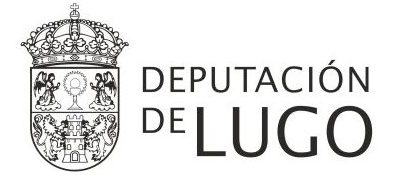

 Concomitentes
Concomitentes